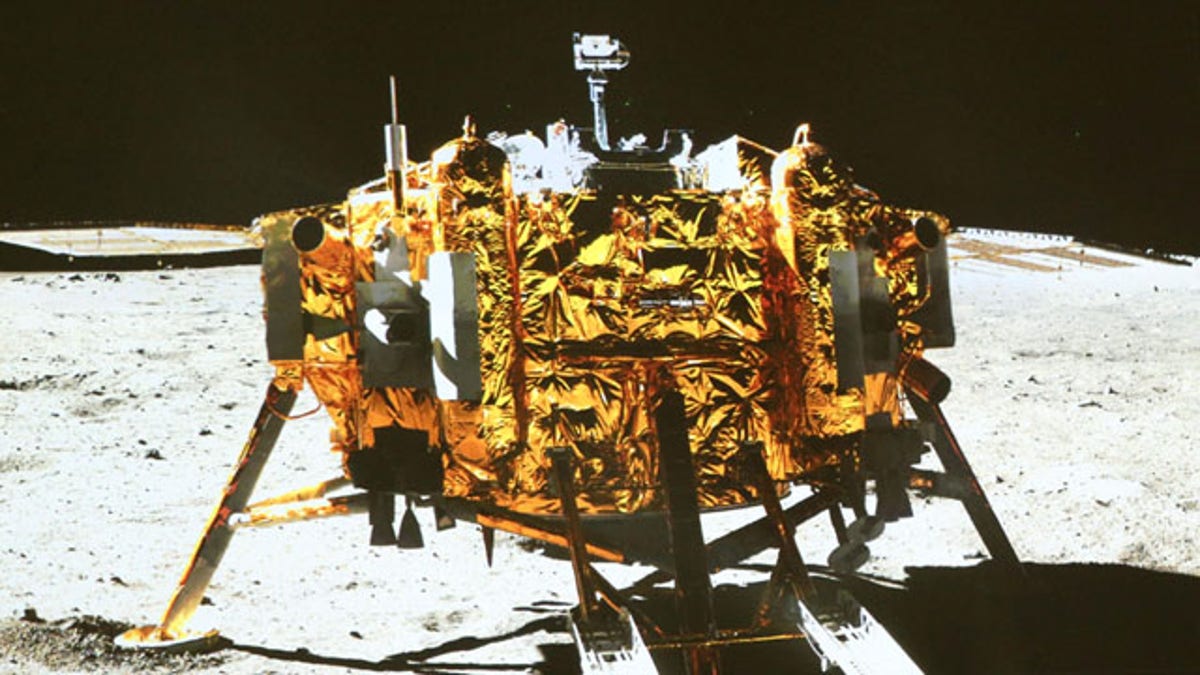
December 15, 2013: This image taken by the on-board camera of the "Yutu" or "Jade Rabbit" rover, and made off the screen of the Beijing Aerospace Control Center in Beijing shows a photo of the Chang'e-3 lander during the mutual-photograph process. (AP Photo/Xinhua)
BEIJING – China said Monday its plan to launch its fifth lunar probe in 2017 with the aim of bringing lunar soil and rock samples to Earth was on track after a successful moon landing of another space probe over the weekend.
The Chang'e 5 mission would mark the third and final phase of China's robotic lunar exploration program and pave the way for possibly landing an astronaut on the moon after 2020.
"Phase three will be a difficult task," said Wu Zhijian, spokesman for the State Administration of Science, Technology and Industry for National Defense. They will have to master technologies to enable the probe to package samples and take off from the moon, and the high-speed re-entry technology that will allow it to return to Earth, Wu said.
On Saturday, Chang'e 3 landed on the moon, marking the first soft landing of a space probe on the moon's surface in 37 years. The landing vehicle will conduct scientific examinations of the landing site for a year and the rover will move about and survey the moon's structure and look for natural resources.
On Sunday, the Chang'e 3's separated landing vehicle and rover took photos of each other for about a minute, the official Xinhua News Agency reported. The color images transmitted back to Earth showed the Chinese flag on the Yutu, or "Jade Rabbit" rover, named after a mythological creature.
Xinhua said the two will have more chances in the coming days to take photos of each other at different angles.
President Xi Jinping and Premier Li Keqiang were at the Beijing Aerospace Control Center to hear lunar program chief commander Ma Xingrui declare the Chang'e 3 mission a success, Xinhua reported.
In a congratulatory message, the Communist Party's central committee, the State Council or China's Cabinet, and the Central Military Commission hailed the mission as a "milestone" in the development of China's space programs, a "new glory" in Chinese explorations and the "outstanding contribution" of China in mankind's peaceful use of space, Xinhua said.
The Chang'e 3 landed on a relatively flat part of the moon known as Sinus Iridum, or the Bay of Rainbows, on Saturday evening, making China the third country to achieve such a landing after the former Soviet Union and United States.
The Chang'e 3 mission is named after a mythical Chinese goddess of the moon and the Yutu rover, or "Jade Rabbit" in English, is the goddess' pet.
Chang'e 4 is intended to be an improved version of the Chang'e 3 that will pave the way for the fifth probe.
China's military-backed space program has made methodical progress in a relatively short time, although it lags far behind the United States and Russia in technology and experience.
